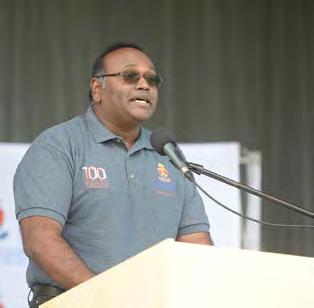
4 minute read
‘Every Cloud Has a Silver Lining’: Art Students’ Resilience
In a very short time, the WIL Office staff created over 200 online groups of six students and one mentor-lecturer, with Ms Zandile Ngcetane leading the initiative to enrol students and their mentor-lecturers in their online groups according to their electives. Ms Genevieve Fourie-Teles and Ms Zandile Ngcetane held preparation and support meetings with academic staff to prepare mentor-lecturers for their task, with Professor Rinelle Evans designing the assessment rubrics and Dr Joyce West providing support with infographics, materials, video explainers and weekly webinars that explained the WIL Lesson Study process. All this preparation came together in the thoughtful design of the clickUP pages developed by Professor Callaghan and Mr Joubert.
Professor Callaghan, who worked tirelessly on the Online Lesson Study Initiative, explained that her biggest challenge was ensuring that all the different needs of all the departments, the WIL Office, the Department of Basic Education and the Lesson Study process were met and supported. The initiative also held various administrative challenges, such as students’ submission issues, mentor-lecturers who struggled to follow the guidelines, and confusion with regard to group allocations, just to mention a few. When the Online Lesson Study Initiative is implemented for a second time, possibly in 2021, many of these issues will be revisited and improved upon.
When considering all the challenges encountered by the faculty workgroup, mentorlecturers, and students, the online Lesson Study implementation was extraordinary and a great success. For example, the online nature itself challenged not only the students but also the mentor-lecturers with regard to technology integration within education. Technology integration also included online assignment submissions and grading (ie, online rubrics) to drive the process and the communities of inquiry that developed in the process. Technological boundaries were shifted in the process and questions regarding social inequalities were addressed. The Lesson Study initiative was unique in how it was conceptualised as part of WIL and professional development. The mentor-teachers’ role was replaced by the collaboration of the members in the group as well as by the weekly involvement of the mentor-lecturers.
Most importantly, the Online Lesson Study Initiative of 2020 showed that the Faculty of Education at UP can accomplish great things even in unprecedented times, particularly when the whole faculty collaborates.
In collaboration with the Molepo Theatre Projects, the School of Fine Arts of the Aristotle University of Thessaloniki (AUT), Greece, and UP Art Education, students planned to work together on an awareness project on albinism. The plan was all set: tickets were bought, the Greek authorities in South Africa provided the visas, and accommodation was organised with families who offered to host the UP art education students. Students were ready to fly to Greece on 25 March 2020. Dr Raita Steyn (Art Education) explains: ‘Our students’ artworks would be exhibited at the AUT while the props and costumes for the South African play, Mama, I Want the Black That You Are, would be created by the Greek students’.
Unfortunately, South Africa went into lockdown on 26 March 2020. All the students and other parties involved were devastated as travel plans had to be deferred until the reopening of all borders. Each student responded differently to the unexpected change: while some saw it as a challenge, for others it was a bitter, disheartening disappointment. For the lecturer, it was a very stressful, emotionally and physically exhausting process. She ran around to sort out issues with passports and visas and to fix the financial aspect of the cancellation without loss. Yet, once all had been settled, she was able to assess the situation from another point of view: ‘Instead for a deadlock, I saw an open opportunity; instead of disappointment, I saw creativity’, says Dr Steyn.
To keep the students’ hopes up, in continuation of the collaboration, she decided to keep the project ‘alive’, though on a smaller scale. Still in the framework of the scholar exchange programme, a shared art project, Stencil as a Social Art Form, materialised through the web-based video conferencing tool, Zoom. Thus, instead of the planned encounter between a handful of students and their counterparts at the Macedonia Airport, now the whole class was to be involved through a Zoom meeting. The aim was twofold: first, to demonstrate to students the personal benefits of resilience and second, to display the pedagogical benefits of technology when used appropriately.
During the online meetings between the UP and Greek students, they showed their relevant artworks and discussed their ongoing projects. The local students assessed the Greek students’ works and vice versa. The critical responses received from the Greek students were most encouraging and highly appreciated. All participants found the sessions an extremely rewarding learning experience and, for the Greek students, a unique opportunity as they were able, in their own words, ‘to share our experiences and work with students from another culture and background and at the same time see and learn from what our counterparts in Pretoria were doing’.
The benefits of resilience were expressed by the positive responses received from both parties after the deferral of the original plan and their excitement and eagerness to meet one other online.










